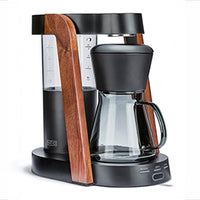How the Wrong Water Can Cancel Out Expensive Beans
Key Takeaways
-
Water makes up over 98% of brewed coffee, so its quality directly impacts flavor
-
Tap water with excess minerals or chlorine can overpower delicate coffee notes
-
Filtered or properly balanced water ensures beans reach their full potential
-
Hard water causes scale buildup that affects brewing performance and lifespan
-
Adjusting water quality is a cost-effective way to elevate your coffee experience
You can invest in top-tier beans, grind them with precision, and use a high-quality coffee machine — but if your water isn’t right, your brew will never taste as good as it should. Water isn’t just a brewing medium; it’s the foundation of your coffee. Since coffee is more than 98% water, the chemical makeup of that water determines how flavors develop and how accurately your beans’ profile comes through.
Why Water Quality Matters More Than Most People Think
When brewing, water doesn’t just pass through coffee grounds — it extracts soluble compounds like acids, sugars, and oils that define the taste and aroma. If the water has an imbalanced mineral composition or contaminants like chlorine, those compounds can be extracted unevenly or overshadowed entirely.
-
Hard water (high calcium and magnesium levels) can exaggerate bitterness, dull sweetness, and leave chalky aftertastes.
-
Soft water (low in minerals) struggles to extract enough flavor, leading to thin, underwhelming brews.
-
Chlorinated water adds chemical notes that mask delicate flavors, especially in lighter roasts.
This means that even the most expensive beans will fail to shine if the water is working against them.
The Science of Minerals and Extraction
The Specialty Coffee Association (SCA) offers a set of water standards designed to help baristas and home brewers get the most out of their beans:
-
Calcium hardness: 50–175 ppm
-
Total alkalinity: Around 40 ppm
-
pH: Close to neutral, around 7.0
These figures ensure that water contains enough minerals to interact positively with coffee compounds, but not so many that they overpower or distort the flavor. Too much calcium, for example, can bind to acids that give coffee brightness, muting them in the final cup.
How Poor Water Cancels Out Premium Beans
High-quality beans are grown, processed, and roasted with extreme care to produce specific flavor notes — maybe floral hints, citrus brightness, or rich chocolate undertones. If your brewing water is poorly balanced, those nuances can disappear.
Using subpar water is like playing a high-definition movie on a fuzzy old TV — the content is good, but the delivery system can’t do it justice. You may end up with a cup that tastes generic, regardless of how unique the beans were meant to be.
Testing Your Water at Home
Improving your water starts with understanding it:
-
Use test strips to measure hardness and alkalinity.
-
Check your local water quality report — many municipalities post this online.
-
Taste your tap water on its own; if it tastes off, it will affect your coffee.
Even if your tap water tastes fine for drinking, brewing demands a more precise mineral balance.
Fixing Common Water Problems
Hard Water Solutions
-
Install a home filtration system with a softening cartridge.
-
Use bottled spring water with moderate mineral content.
-
Descale your coffee machine regularly to remove mineral buildup.
Soft Water Solutions
-
Add a mineral cartridge or use coffee-specific mineral packets.
-
Blend distilled water with mineral-rich water to create balance.
Chlorine Issues
-
Run tap water through a carbon filter.
-
Let tap water sit uncovered for 24 hours before brewing.
Preventing Machine Damage from Bad Water
Bad water doesn’t just hurt flavor — it harms your equipment. Hard water can coat heating elements and pipes with scale, reducing water flow, lowering brew temperatures, and forcing the machine to work harder. Over time, this shortens the lifespan of even the best machines.
The Ratio Coffee Perspective
Even a precision-engineered coffee machine from Ratio Coffee won’t be able to overcome severely unbalanced water. The equipment ensures optimal brewing temperature and consistency, but the water’s chemistry still dictates the end result. Matching a quality machine with properly balanced water allows every subtle note in your beans to come forward.
Why Fixing Your Water is the Easiest Upgrade
Water quality is one of the cheapest and most effective ways to improve your coffee game. Before spending more on exotic beans or new gear, consider fine-tuning your water. The improvement can be immediate and dramatic.
Bringing It All Together
If you’re serious about coffee, think of water as an ingredient — not just a brewing medium. Get the mineral balance right, remove unwanted chemicals, and you’ll unlock flavors you may have never tasted before in your favorite beans.
Frequently Asked Questions
Is bottled water better for coffee?
Not always. Some bottled water is too hard or too soft. Check the label for mineral content.
Can I use distilled water?
No — it lacks minerals entirely, leading to flat-tasting coffee. If using distilled water, remineralize it.
Does boiling remove chlorine?
It can reduce it slightly, but filtration is far more effective.
How often should I descale my coffee machine?
Every 1–3 months, depending on water hardness.
Will fixing my water make cheap beans taste premium?
It can make them taste better, but it won’t add complexity that isn’t there to begin with.
 Ratio Eight S2
Ratio Eight S2
 Ratio Eight Original
Ratio Eight Original
 Ratio Six
Ratio Six
 Ratio Four
Ratio Four
 Compare Machines
Compare Machines






